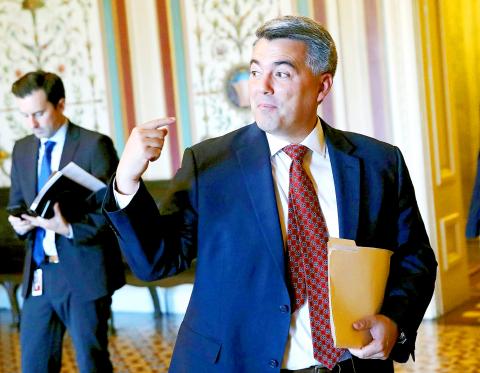The Ministry of Foreign Affairs yesterday thanked the US Senate Committee on Foreign Relations for passing the Taiwan Allies International Protection and Enhancement Initiative (TAIPEI) bill, which it called “concrete action” to help Taiwan stabilize its diplomatic relations.
First introduced in September last year, the bill was authored by US senators Cory Gardner — chairman of the Senate Foreign Relations Subcommittee on East Asia, the Pacific and International Cybersecurity Policy — and Chris Coons, Gardner’s office said in a news release on Wednesday.
“This bipartisan legislation demands a whole-of-government approach to ramp up our support for Taiwan, and will send a strong message to nations that there will be consequences for supporting Chinese actions that undermine Taiwan,” Gardner said.

Photo: AFP
“I will continue to advocate on behalf of Taiwan and the Taiwanese people, as guided by United States law,” he said.
The bill says that the US secretary of state may adjust US assistance to countries taking or anticipating actions to alter or downgrade official or unofficial ties with Taiwan.
It should be the US’ policy to advocate for Taiwan’s membership in all international organizations in which statehood is not a requirement and for Taiwan to be granted observer status in other appropriate international organizations, it says.
The bill must still be approved by the US Senate, as well as the House of Representatives, before it can be signed into law by the president.
Ministry spokeswoman Joanne Ou (歐江安) yesterday expressed the ministry’s gratitude to the US Congress for taking concrete action to help Taiwan stabilize its diplomatic relations.
China instigated the Pacific nations of the Solomon Islands and Kiribati to cut diplomatic relations with Taiwan in a bid to suppress its international space and force Taiwanese to accept the “one country, two systems” framework, she said.
China’s plotting has been received with abomination by Taiwanese and has caused an increase in support for Taiwan from the global community, Ou said, adding that Taipei would not cave in to Beijing’s pressure.
The ministry would continue observing the bill’s development in Congress, while pragmatically working hand in hand with the US to defend democratic institutions, she said.
Separately yesterday, President Tsai Ing-wen (蔡英文) said that China has long been suppressing Taiwan by poaching diplomatic allies and that all possibilities must be considered in the run-up to presidential and legislative elections on Jan. 11 next year.
The ministry has been instructed to bolster its efforts to maintain relations with diplomatic allies and boost the confidence of the public, she added.
Additional reporting by CNA

Taiwan is projected to lose a working-age population of about 6.67 million people in two waves of retirement in the coming years, as the nation confronts accelerating demographic decline and a shortage of younger workers to take their place, the Ministry of the Interior said. Taiwan experienced its largest baby boom between 1958 and 1966, when the population grew by 3.78 million, followed by a second surge of 2.89 million between 1976 and 1982, ministry data showed. In 2023, the first of those baby boom generations — those born in the late 1950s and early 1960s — began to enter retirement, triggering

One of two tropical depressions that formed off Taiwan yesterday morning could turn into a moderate typhoon by the weekend, the Central Weather Administration (CWA) said yesterday. Tropical Depression No. 21 formed at 8am about 1,850km off the southeast coast, CWA forecaster Lee Meng-hsuan (李孟軒) said. The weather system is expected to move northwest as it builds momentum, possibly intensifying this weekend into a typhoon, which would be called Mitag, Lee said. The radius of the storm is expected to reach almost 200km, she said. It is forecast to approach the southeast of Taiwan on Monday next week and pass through the Bashi Channel

NO CHANGE: The TRA makes clear that the US does not consider the status of Taiwan to have been determined by WWII-era documents, a former AIT deputy director said The American Institute in Taiwan’s (AIT) comments that World War-II era documents do not determine Taiwan’s political status accurately conveyed the US’ stance, the US Department of State said. An AIT spokesperson on Saturday said that a Chinese official mischaracterized World War II-era documents as stating that Taiwan was ceded to the China. The remarks from the US’ de facto embassy in Taiwan drew criticism from the Ma Ying-jeou Foundation, whose director said the comments put Taiwan in danger. The Chinese-language United Daily News yesterday reported that a US State Department spokesperson confirmed the AIT’s position. They added that the US would continue to

The number of Chinese spouses applying for dependent residency as well as long-term residency in Taiwan has decreased, the Mainland Affairs Council said yesterday, adding that the reduction of Chinese spouses staying or living in Taiwan is only one facet reflecting the general decrease in the number of people willing to get married in Taiwan. The number of Chinese spouses applying for dependent residency last year was 7,123, down by 2,931, or 29.15 percent, from the previous year. The same census showed that the number of Chinese spouses applying for long-term residency and receiving approval last year stood at 2,973, down 1,520,